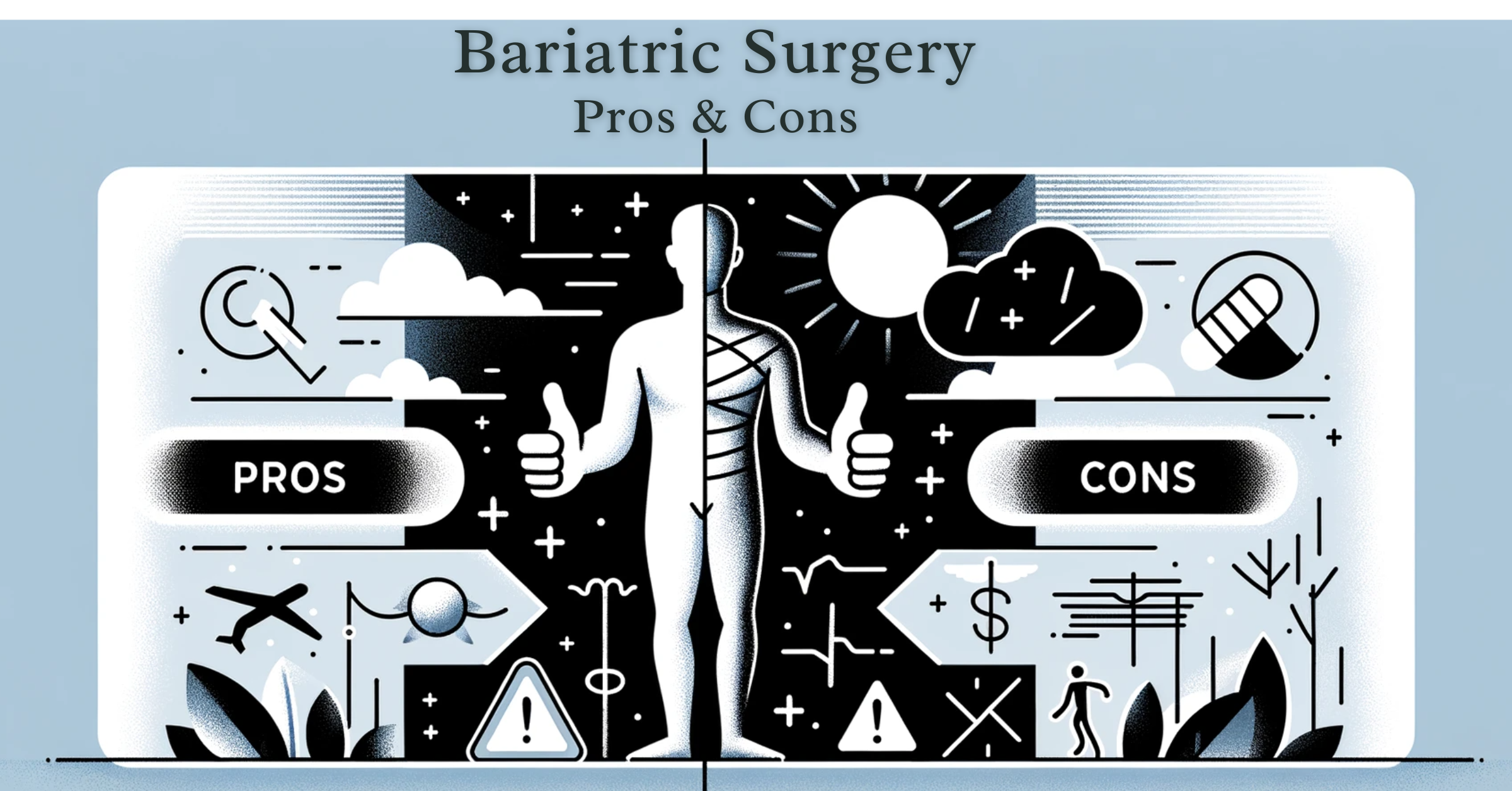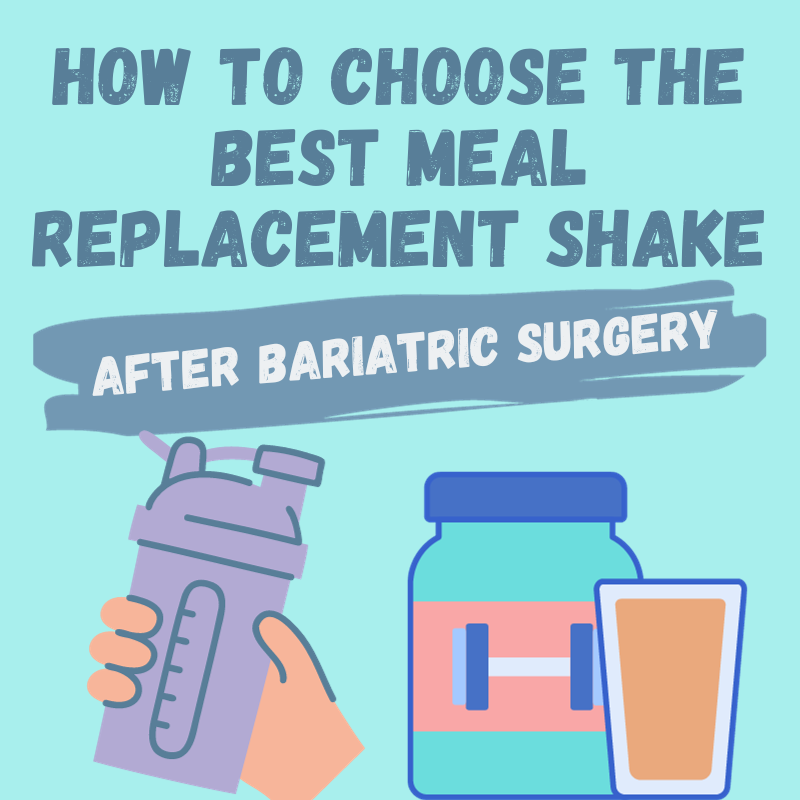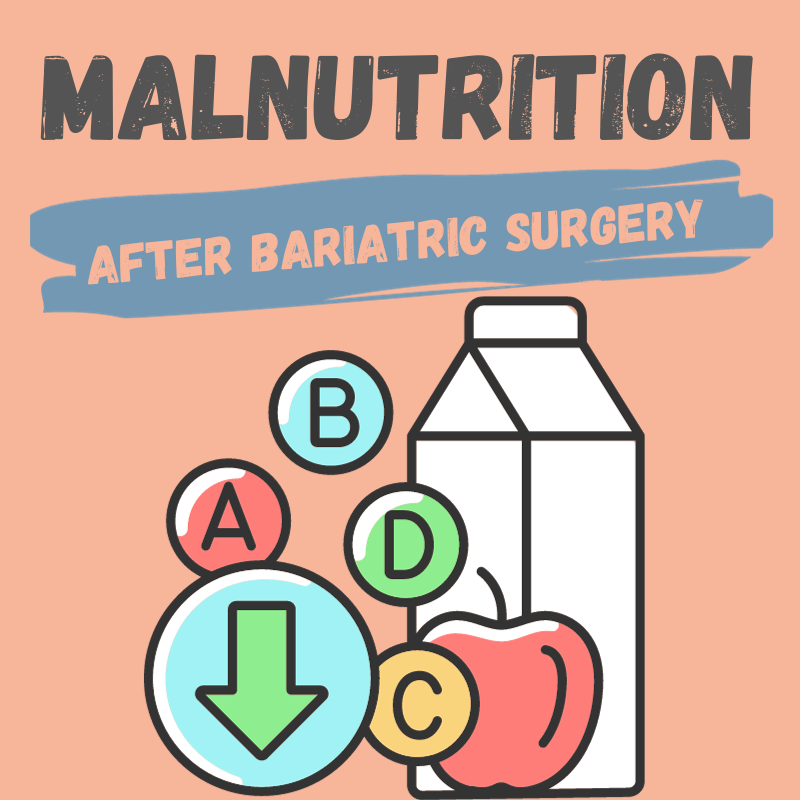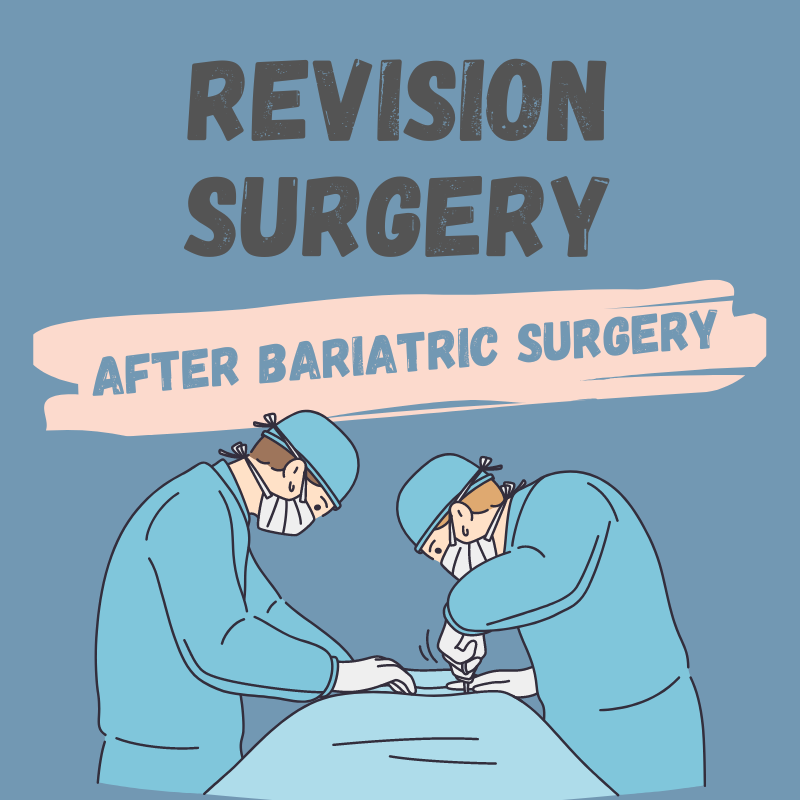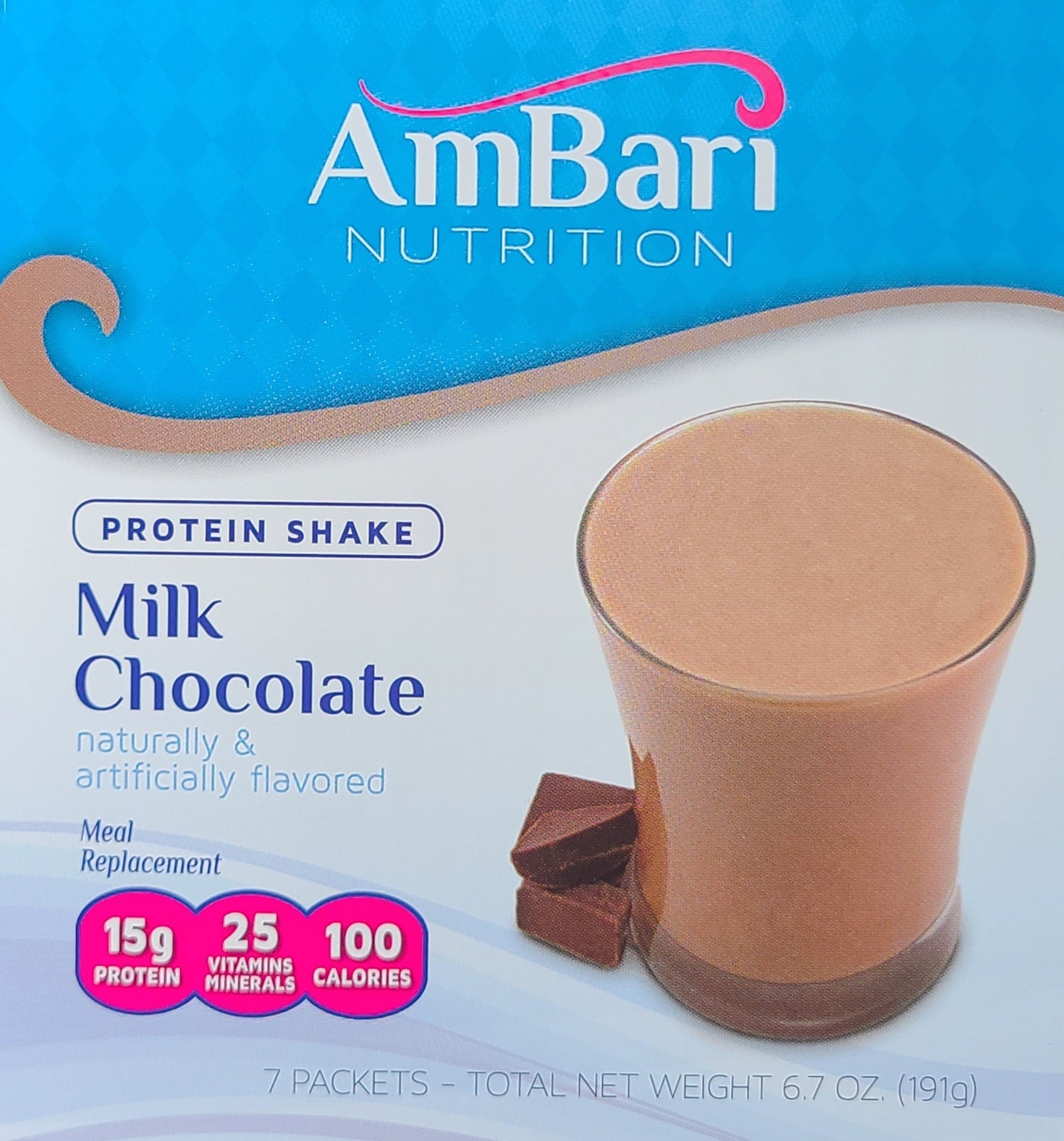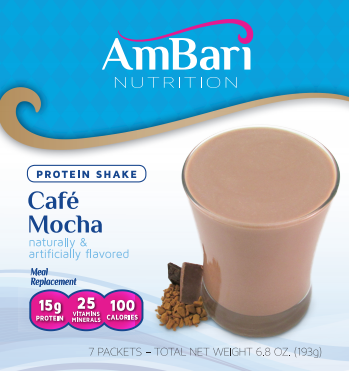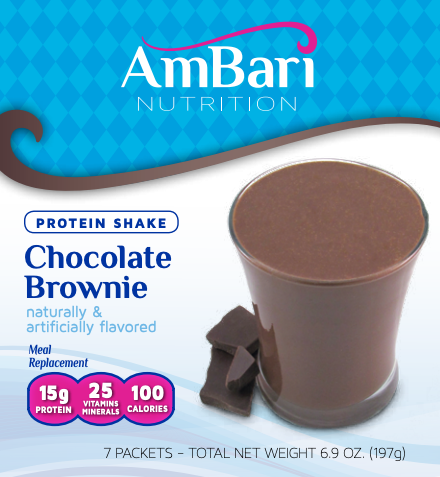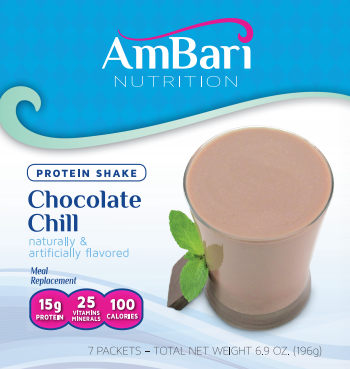Your cart is empty
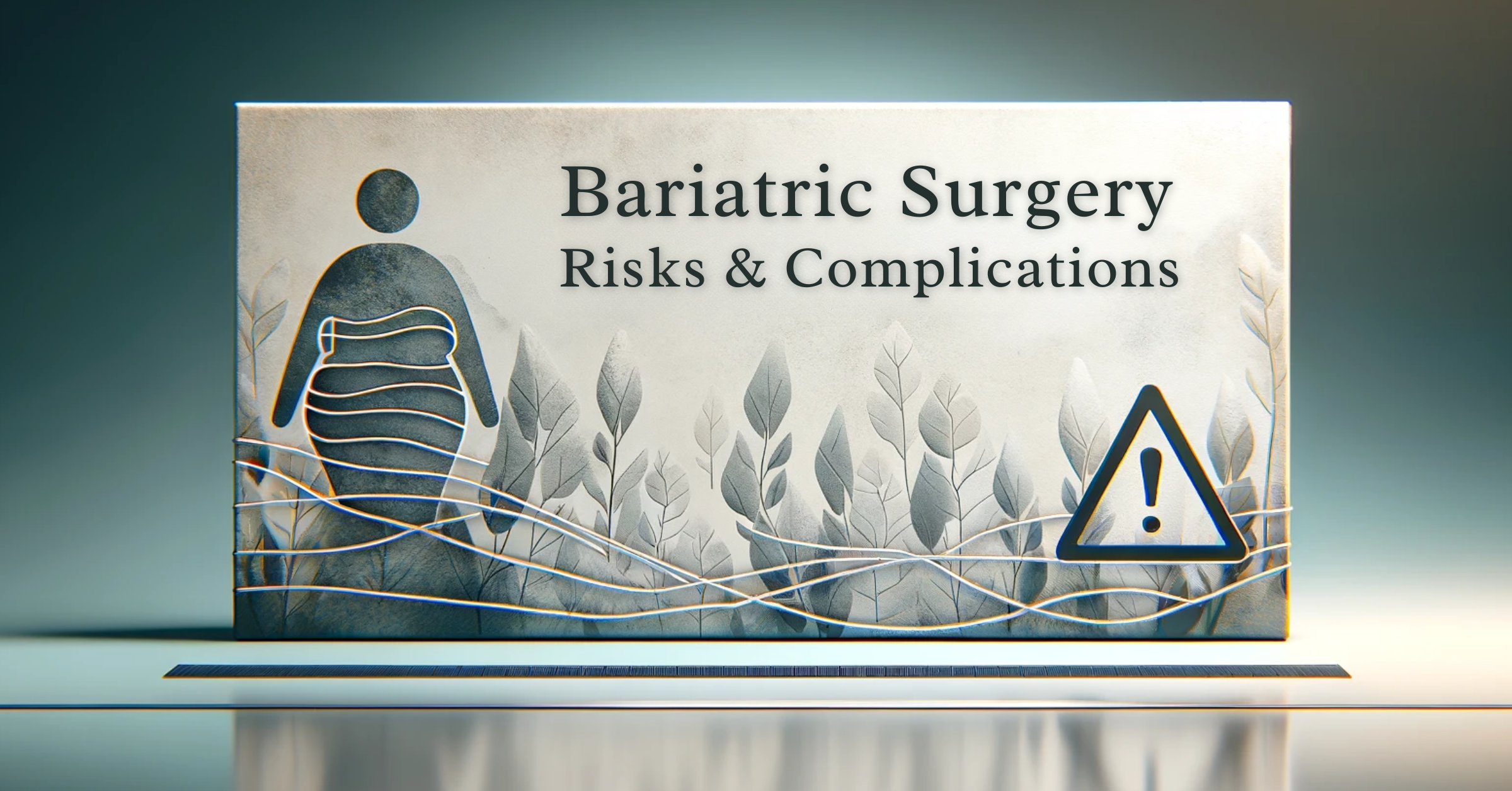
Bariatric Surgery Risks, Complications, and Negative Side Effects

Choosing bariatric surgery is a big step towards a healthier life. But like any major decision, it's important to know what you're getting into. This article breaks down the potential risks and side effects of different weight loss surgeries. We'll cover everything from immediate complications to long-term changes you might experience. Our goal is to give you a clear picture of what to expect, so you can make the best decision for your health.
Table Of Contents
- Types of Bariatric Surgery Procedures
- Short-term Complications
- Long-term Complications
- Psychological Side Effects
- Weight Regain
- Risks Specific to Bariatric Surgery Procedures
- Reducing the Risk of Complications
- Conclusion
Types of Bariatric Surgery Procedures
There are several types of bariatric surgery, each with its unique approach to promoting weight loss:
-
Gastric bypass (Roux-en-Y gastric bypass): This procedure involves creating a small stomach pouch and bypassing a portion of the small intestine. The smaller stomach restricts food intake, and bypassing the intestine reduces nutrient absorption.

-
Sleeve gastrectomy (gastric sleeve): In this procedure, a large portion of the stomach is removed, leaving a smaller, tube-like structure. The reduced stomach size limits food intake and promotes a feeling of fullness more quickly.

-
Adjustable gastric banding: A silicone band is placed around the upper part of the stomach, creating a small pouch. The band can be adjusted to control the size of the opening between the pouch and the rest of the stomach, limiting the amount of food that can be consumed.

- Biliopancreatic diversion with duodenal switch: This complex procedure involves removing a portion of the stomach and rerouting the small intestine to decrease nutrient absorption. A section of the small intestine, where the majority of nutrient absorption occurs, is bypassed, leading to significant weight loss.
The reason we talk about potential complications and risks is that, while bariatric surgery can really help with weight loss and overall health, it's important to know and understand the possible risks that come with these procedures. When patients and doctors are aware of these risks, they can make smarter decisions about whether bariatric surgery is the best option and take steps to reduce any problems. Also, being aware of possible side effects can help patients spot issues early on and get the right care, leading to better results in the long run.

Short-term Complications
Bleeding
- Causes and risk factors: Bleeding might happen because of mistakes during surgery, issues with the patient, or existing medical problems. Using blood thinners, having prior surgeries, and certain blood disorders can increase bleeding risks.
- Prevention and management: To prevent bleeding, doctors will check for risk factors before surgery and may temporarily stop blood thinners. They'll also use careful surgical techniques. If bleeding happens, it can be treated with blood transfusions, clotting medications, or, in severe cases, another surgery to fix the problem.
Infection
- Causes and risk factors: Infections can develop when bacteria enter the surgical site. Risk factors include uncontrolled diabetes, smoking, obesity, malnutrition, and poor hygiene. Existing skin infections or bacteria resistant to antibiotics can also raise the risk.
- Prevention and management: To avoid infection, doctors give antibiotics before surgery, keep the surgery area clean, and teach patients how to care for their wounds. If an infection happens, it can be treated with more antibiotics, wound care, and sometimes surgery to remove the infected tissue or drain the infection.
Blood clots
- Causes and risk factors: Blood clots can form in the legs (deep vein thrombosis) or lungs (pulmonary embolism) if a person doesn't move, their blood vessels get damaged, or their blood clots more easily. Risk factors include obesity, smoking, a history of blood clots, and certain genetic conditions.
- Prevention and management: To prevent blood clots, doctors may give blood thinners, recommend compression stockings, and encourage patients to move around soon after surgery. If a clot forms, it can be treated with blood-thinning medications, clot-dissolving drugs, or, in some cases, surgery to remove the clot.
Adverse reactions to anesthesia
- Causes and risk factors: Bad reactions to anesthesia can happen because of a person's sensitivity, medication interactions, or existing medical problems like heart, lung, or kidney issues. A history of bad reactions to anesthesia or a family history of anesthesia complications can also increase the risk.
- Prevention and management: To prevent bad reactions, doctors will carefully review medications and medical history before surgery. They'll also monitor patients during surgery and adjust anesthesia as needed. If a bad reaction happens, it can be managed with medication adjustments, help with breathing, or other supportive treatments as needed.
"Post-surgery complications, while manageable, are a reality of bariatric surgery. It's crucial for patients to recognize early signs of issues like nutrient deficiencies or psychological effects to address them promptly." ~ Dr. K. Huffman
Long-term Risks From Bariatric Surgery
Nutrient Deficiencies
- Causes and risk factors: After bariatric surgery, people might not get enough nutrients because they eat less, can't absorb nutrients as well, or both. Eating poorly, not taking supplements, and not following post-surgery guidelines can increase these risks.
- Prevention and management: To avoid nutrient deficiencies, it's essential to adhere to a well-balanced post bariatric surgery diet, take prescribed supplements, and go to regular check-ups. If deficiencies happen, they can be treated with more supplements, changes to the diet, or help from a healthcare professional.
Hair Loss
Causes and risk factors: Hair loss after bariatric surgery may be caused by a combination of factors, including:
- Telogen effluvium: This is a temporary hair loss condition where more hair follicles than normal enter the resting phase, leading to increased shedding.
- Nutritional deficiencies: A lack of essential nutrients, especially protein, iron, and vitamins, can contribute to hair loss.
- Hormonal imbalances: Changes in hormone levels after surgery can affect hair growth.
- Stress: The physical and emotional stress related to surgery and lifestyle changes may also play a role in hair loss.
Prevention and management: To minimize the risk of hair loss and manage it effectively, follow these tips:
- Maintain a balanced diet: Consume adequate amounts of protein and nutrient-rich foods to support hair growth.
- Take supplements as recommended: Follow your doctor's guidance on supplements to prevent nutritional deficiencies. They will likely recommend bariatric vitamins.
- Manage stress: Participate in support groups and practice relaxation techniques like deep breathing, meditation, or yoga to cope with stress.
- Practice good hair care: Use gentle hair products, avoid heat styling tools, and get regular trims to maintain hair health.
If you notice persistent hair loss despite these measures, consult a medical professional for further evaluation and treatment options. They can help identify any underlying issues and recommend appropriate treatments to promote hair regrowth.
Gastrointestinal Issues After Surgery

- Dumping syndrome: When the stomach empties too fast, it can cause cramps, nausea, diarrhea, and dizziness. This often happens after eating high-sugar or high-fat foods. To prevent it, follow the recommended diet, eat smaller meals, and avoid trigger foods. Treatment includes changing the diet, taking medication, and, in severe cases, more surgery. Read more on How to Handle Dumping Syndrome…
- Gastric leakage: Stomach contents leaking into the abdomen can cause infection or abscesses. Prevention includes careful surgery and post-surgery care. Treatment involves antibiotics, draining the fluid, and, if needed, another surgery. Learn more about Gastric Sleeve Leaks…
- Bowel obstruction: The intestines can get blocked because of scar tissue, internal hernias, or narrowed areas. Prevention includes careful surgery and early detection of problems. Treatment involves resting the bowels and staying hydrated, or surgery in more severe cases. Click here to learn more about Bowel Obstructions after weight loss surgery
- GERD: A potential complication where stomach acid frequently flows back into the tube connecting your mouth and stomach (esophagus). This backwash (acid reflux) can irritate the lining of your esophagus, causing symptoms like heartburn, chest pain, and difficulty swallowing. Read more: GERD After Bariatric Surgery
Gallstones
- Causes and risk factors: Losing weight quickly after bariatric surgery can increase the risk of forming gallstones. Obesity, genetics, and being female can also raise the risk.
- Prevention and management: Some doctors may give medications to prevent gallstones or suggest removing the gallbladder during bariatric surgery. If gallstones develop, they can be treated with medications or surgery to remove the gallbladder.
Hernias
- Causes and risk factors: Hernias can happen after surgery where the incisions were made or inside the abdomen when the intestines push through weak spots. Obesity, poor wound healing, high abdominal pressure, and heavy lifting can increase the risk.
- Prevention and management: To prevent hernias, maintain a healthy weight, avoid straining the abdominal muscles, and follow post-surgery lifting restrictions. Painful, uncomfortable, or complicated hernias might need surgical repair.
"Choosing bariatric surgery is more than a medical decision; it's a commitment to a new lifestyle. Patients must understand both the transformative benefits and the inherent risks to make an informed choice." ~ Dr. K. Huffman
Psychological Risks & Side Effects from Bariatric Surgery

Body Image Issues
Losing a lot of weight quickly can change the way someone looks, leading to loose skin and a different self-image. Some people might have a hard time adjusting to their new appearance, feeling unhappy with their body or having a distorted self-image. Psychological support and counseling can help patients adapt and develop a healthier body image.
Depression and Anxiety
While bariatric surgery can improve mental health for some, others might feel more depressed or anxious. This could be due to unrealistic expectations, dealing with lifestyle changes, or unresolved emotional issues. Access to mental health professionals and support groups can be important for handling these emotional challenges.
Addiction Transfer
Before surgery, some people might have used food to cope with stress. When they can't eat as much after surgery, they might turn to other addictive substances or behaviors like alcohol, drugs, or compulsive shopping. Early identification and addressing these issues through therapy and support groups can help prevent new addictions.
Relationship Changes
After bariatric surgery, weight loss and lifestyle changes can affect personal relationships. Friends and family might struggle to adapt to the patient's new look, habits, and increased self-confidence. Romantic relationships might also face challenges as partners adjust to the physical and emotional changes. Open communication and counseling can help manage these relationship changes.
Weight Regain
- Causes and risk factors: Weight regain after bariatric surgery can result from multiple factors, such as not following the recommended diet, not exercising, emotional eating, or sometimes due to surgical complications that make the procedure less effective. It's important to find and address the causes of weight regain for long-term success.
- Prevention and management strategies: To prevent and manage weight regain, patients should stick to the suggested diet and exercise plan after surgery, go to regular follow-up appointments, and join support groups or counseling.
Developing healthy ways to cope with stress and emotional challenges can also help maintain weight loss. If weight regain happens despite these efforts, healthcare providers might recommend other options, such as revision surgery or different weight management strategies.
Risks Specific to Bariatric Surgery Procedures
Gastric Bypass Risks:
- Anastomotic leaks: Leakage from the connections between the stomach pouch and small intestine can lead to infection and abscess formation.
- Ulcers: Peptic ulcers can develop at the site of the anastomosis, causing pain and bleeding.
- Internal hernias: The rearrangement of the intestines during surgery can lead to hernias, which can cause bowel obstruction.
- Dumping syndrome: As mentioned previously, rapid stomach emptying can cause a range of symptoms, including cramps, nausea, and dizziness.
Sleeve Gastrectomy Risks:
- Staple line leaks: Leaks from the staple line along the remaining stomach can cause infection and abscess formation.
- Gastric stenosis: Narrowing of the stomach can lead to difficulty swallowing and obstructed food passage.
- Gastroesophageal reflux disease (GERD): The reduced stomach size may worsen pre-existing GERD or cause new symptoms.
Adjustable Gastric Banding Risks:
- Band slippage or erosion: The gastric band can slip out of position or erode into the stomach, requiring adjustment or removal.
- Port complications: The access port used to adjust the band can become infected or dislodged.
- Esophageal dilation or dysmotility: The band can cause dilation or reduced motility of the esophagus, leading to swallowing difficulties.
Biliopancreatic Diversion with Duodenal Switch Risks:
- Malnutrition: Due to the extensive intestinal bypass, there is an increased risk of severe nutrient deficiencies and malnutrition.
- Liver failure: Rapid weight loss and malabsorption can lead to liver dysfunction or failure.
- Protein-calorie malnutrition: Insufficient protein intake and absorption can cause muscle wasting, weakness, and other complications.
Reducing the Risk of Complications
- Choosing an experienced surgeon: Picking a surgeon who has a vast amount of experience in bariatric surgery can lower the chances of complications and make sure you get the best possible results.
- Preoperative evaluation and preparation: Complete evaluations before surgery, including checking your medical, nutritional, and mental health, can help find potential risks and make sure you're as healthy as possible before the operation.
- Postoperative care and follow-up: Following the guidelines after surgery, going to follow-up appointments, and quickly reporting any unusual symptoms can help catch and deal with complications early on.
- Importance of lifestyle changes: Adopting a healthy bariatric diet, exercising regularly, and making other positive changes in your life will play a big part in the long-term success of your weight loss surgery and lower the chances of complications.
Conclusion
Ultimately, deciding on bariatric surgery involves carefully balancing the potential risks against the benefits. While these procedures can aid in weight loss and enhance health, they also come with possible complications and side effects. It's important to weigh both the positive and negative aspects and discuss them with your family and doctors to make the best decision for your unique situation.
Author: Allison Eisenberg Allison is a certified nutritionist and author with over 15 years of experience writing in the health and weight loss industry. She is passionate about helping people achieve their goals through proper nutrition and exercise. As a certified nutritionist, Allison has worked with clients from all walks of life and helped them make positive changes to their diet and lifestyle. |
Reviewed By: Dr. K. Huffman Kevin D. Huffman, D.O. is a board-certified bariatric physician who has dedicated his career to treating obesity. With over 10,000 patients under his care, he has become a respected authority in the field of bariatric medicine. Dr. Huffman has trained and mentored hundreds of healthcare providers and is widely recognized as a national leader in the field. |
Bariatric Guides & Information
More Info
Customer Favorites
- Choosing a selection results in a full page refresh.









